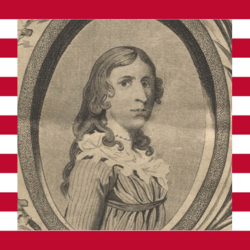
How many female soldiers do you know? Chances are, even if you have never met one personally, you have probably seen some women in the military within your lifetime. While it is normal for women to be involved in combat today, that was not always the case–until 1948 in the United States, it was a crime for women to take up arms!
During the Revolutionary War, both British and Rebel troops denied women access to combat tools and relegated them to doing soldier’s laundry or working in the infirmary; jobs that women were allowed to take on were critically important, but it is easy to see that some may have thought that they were unjustifiably excluded from the combat positions that they wanted to undertake.
Deborah Sampson, born in 1760 in Plymouth, Massachusetts, was a fantastic woman who fought against these suppressive rules and demonstrated her determination to fight for the Revolutionary troops against all odds.
Born into a poor family and later becoming an indentured servant at the age of 10, it seemed unlikely that Deborah would have the opportunity to make history. However, at 18 years old and after spending nearly a decade in servitude, she finally earned her freedom and was intent on using it to fulfil her aspirations of patriotism by participating in the American Revolution.
While Deborah could have enrolled in the troops as a woman and worked in their camps, she instead chose to dress like a man and join the Fourth Regiment of the Massachusetts Revolutionary Army under the name Robert Shurtleff. Doing so was the only way she would be allowed to fight.
Over time, Deborah, or “Robert,” moved up in rank within the army, and she was eventually able to lead a raid of infantrymen on a British hideout and arrest more than a dozen redcoat troops. Deborah continued working covertly for a year and a half, participating in many great battles, including the Battle of Yorktown but was eventually discovered to be a woman after being shot and losing consciousness.
Following an honorable discharge from the military, Deborah married Benjamin Gannet and had three children. She also received a military pension from the government for her involvement in the Revolution. Before her death of yellow fever in 1827, Deborah traveled across the country lecturing on her experience as a female soldier in the Revolutionary Army and spreading patriotism throughout the states. She lived an exciting and honorable life and truly represents just one of the many brave girls that participated in the American Revolution.
